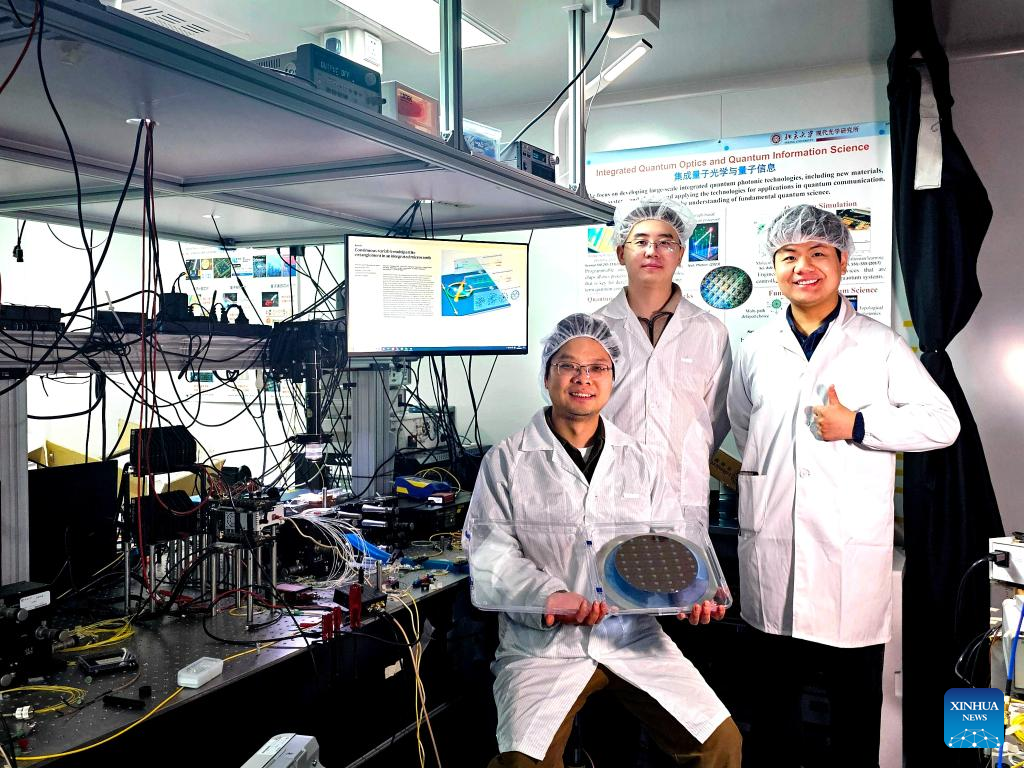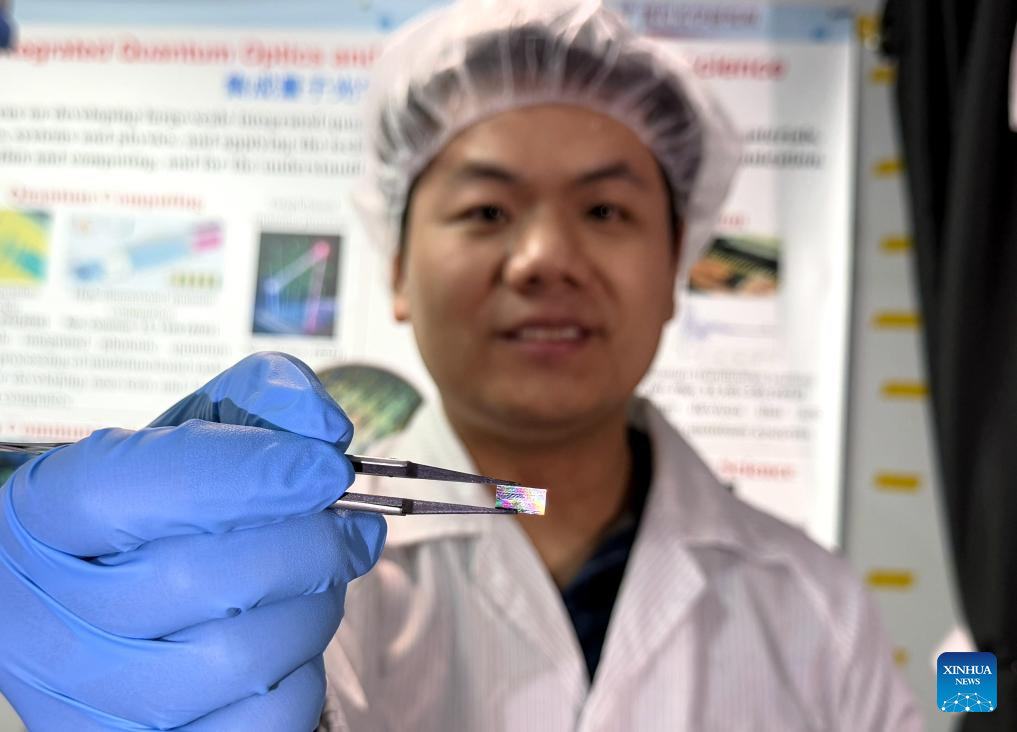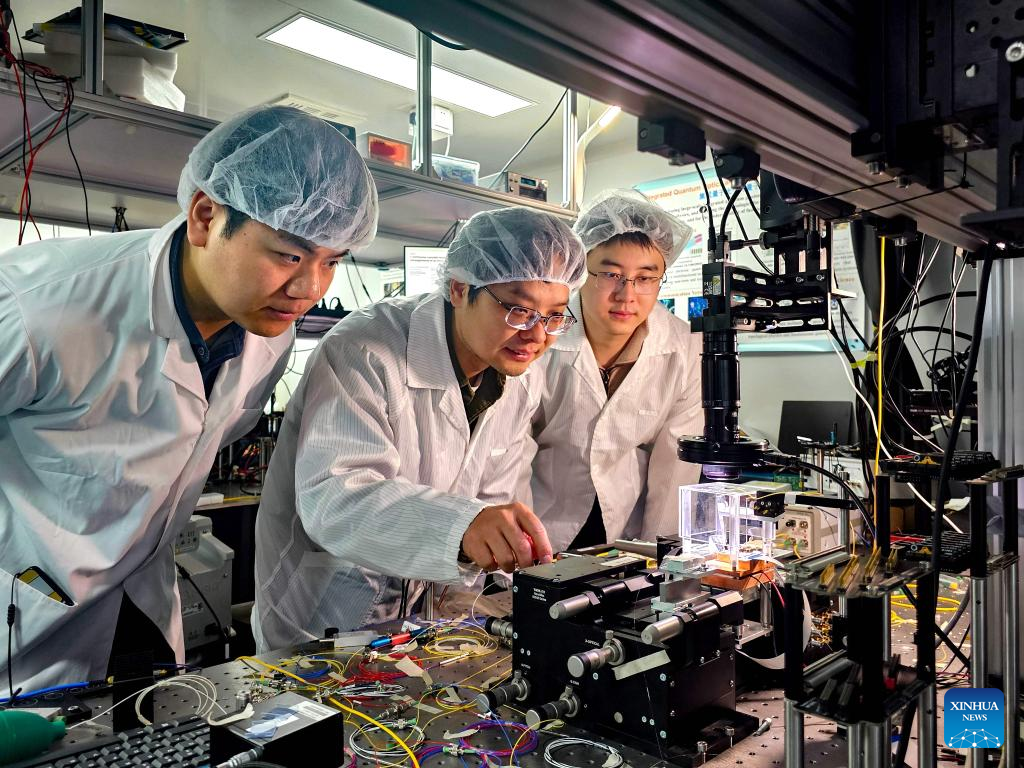
Wang Jianwei (front), a professor at Peking University, displays a Silicon-based photonic quantum chip wafer while posing for photos with his team members in a laboratory of Peking University in Beijing, capital of China, Feb. 18, 2025. Chinese scientists have achieved a major breakthrough in integrated photonic quantum chips by demonstrating the first "continuous-variable" quantum multipartite entanglement and cluster states on the chip. The breakthrough addresses a critical gap in the development of photonic quantum chips and lays the foundation for scalable quantum entanglement, with potential applications in quantum computing and quantum networks. The research, led by scientists from Peking University and Shanxi University, was published in the latest issue of Nature. (Xinhua)
BEIJING, Feb. 20 (Xinhua) -- Chinese scientists have achieved a major breakthrough in integrated photonic quantum chips by demonstrating the first "continuous-variable" quantum multipartite entanglement and cluster states on the chip.
The breakthrough addresses a critical gap in the development of photonic quantum chips and lays the foundation for scalable quantum entanglement, with potential applications in quantum computing and quantum networks.
The research, led by scientists from Peking University and Shanxi University, was published in the latest issue of Nature.
Integrated photonic quantum chips are advanced platforms designed to encode, process, transmit, and store quantum information at the chip level. However, achieving large-scale quantum entanglement of photonic qubits on these chips has long posed a significant challenge.
One key difficulty has been the deterministic and scalable preparation of cluster states, which are crucial in quantum information science, particularly for photonic quantum chips, said Wang Jianwei, a professor at Peking University.
By developing new technologies for coherent pumping, control, and measurement of continuous-variable cluster states, the team successfully prepared various cluster states in a deterministic and reconfigurable manner. The entanglement structures were rigorously validated through extensive experimental testing.
"We have pioneered the development of a continuous-variable quantum chip, enabling the deterministic generation of cluster states directly on the chip," Wang said. "Our work highlights the potential of these integrated devices for advancing quantum computing, networking and sensing."
"This achievement marks a breakthrough by Chinese scientists in the field of integrated photonic quantum chips," said Gong Qihuang, an academician of the Chinese Academy of Sciences.
This breakthrough opens a new pathway for the preparation and manipulation of large-scale quantum entangled states, which are critical for the development of quantum computing and quantum network technologies, Gong said.
Earlier, the research team developed an ultra-large-scale photonic quantum chip that integrates about 2,500 components, providing a scalable and stable core for future quantum computers. ■

Jia Xinyu, a doctoral student of Peking University, displays an integrated photonic quantum chip in a laboratory of Peking University in Beijing, capital of China, Feb. 18, 2025. Chinese scientists have achieved a major breakthrough in integrated photonic quantum chips by demonstrating the first "continuous-variable" quantum multipartite entanglement and cluster states on the chip.
The breakthrough addresses a critical gap in the development of photonic quantum chips and lays the foundation for scalable quantum entanglement, with potential applications in quantum computing and quantum networks.
The research, led by scientists from Peking University and Shanxi University, was published in the latest issue of Nature. (Xinhua)

Wang Jianwei (C), a professor at Peking University, tests an integrated photonic quantum chip with doctoral students Jia Xinyu (L) and Zhai Chonghao in a laboratory of Peking University in Beijing, capital of China, Feb. 18, 2025. Chinese scientists have achieved a major breakthrough in integrated photonic quantum chips by demonstrating the first "continuous-variable" quantum multipartite entanglement and cluster states on the chip.
The breakthrough addresses a critical gap in the development of photonic quantum chips and lays the foundation for scalable quantum entanglement, with potential applications in quantum computing and quantum networks.
The research, led by scientists from Peking University and Shanxi University, was published in the latest issue of Nature. (Xinhua)



